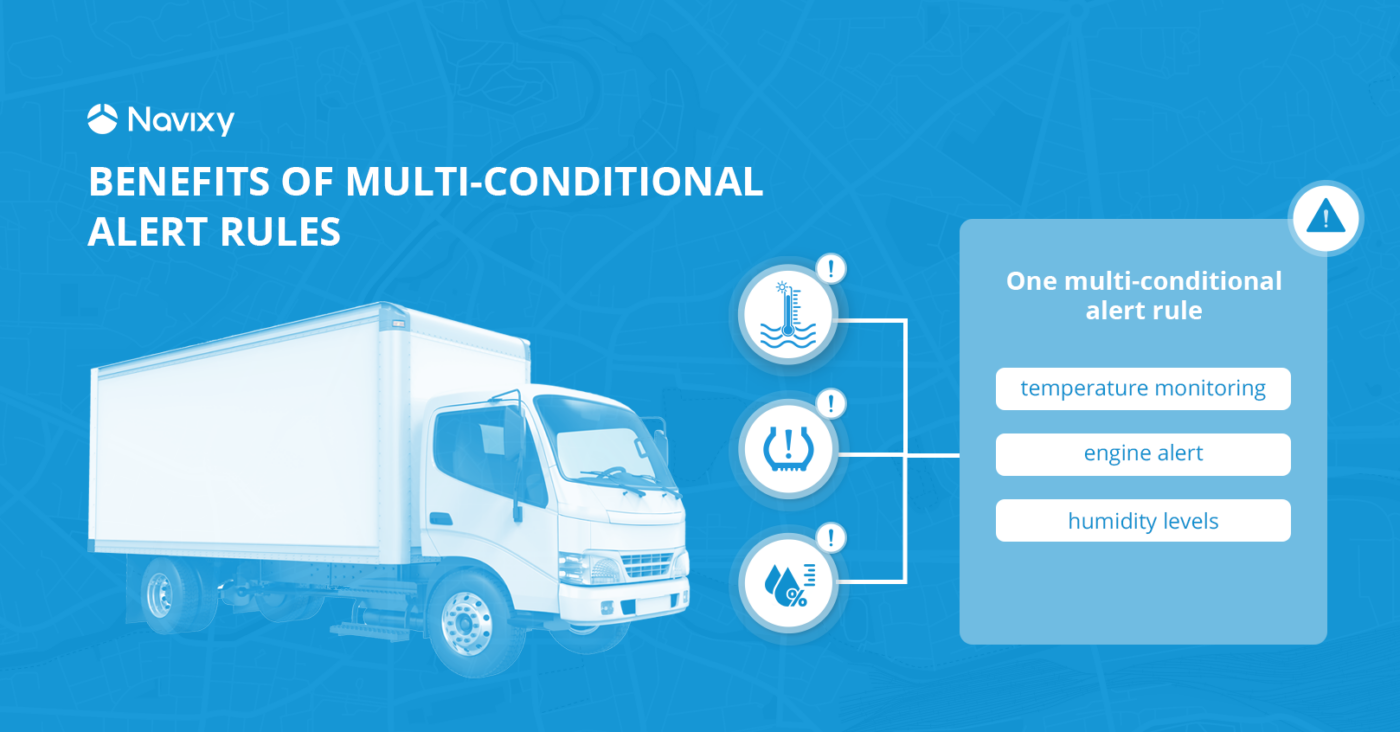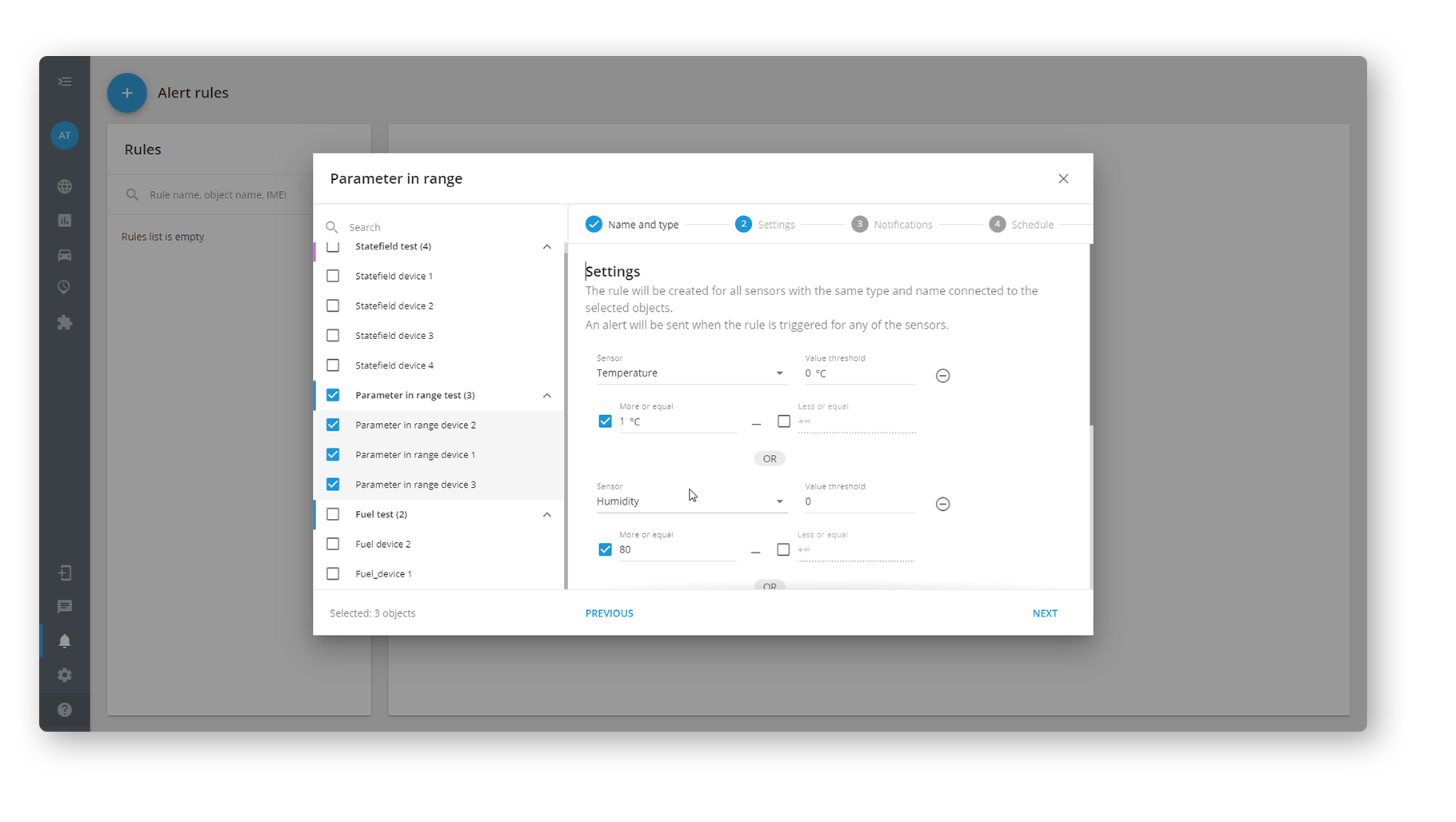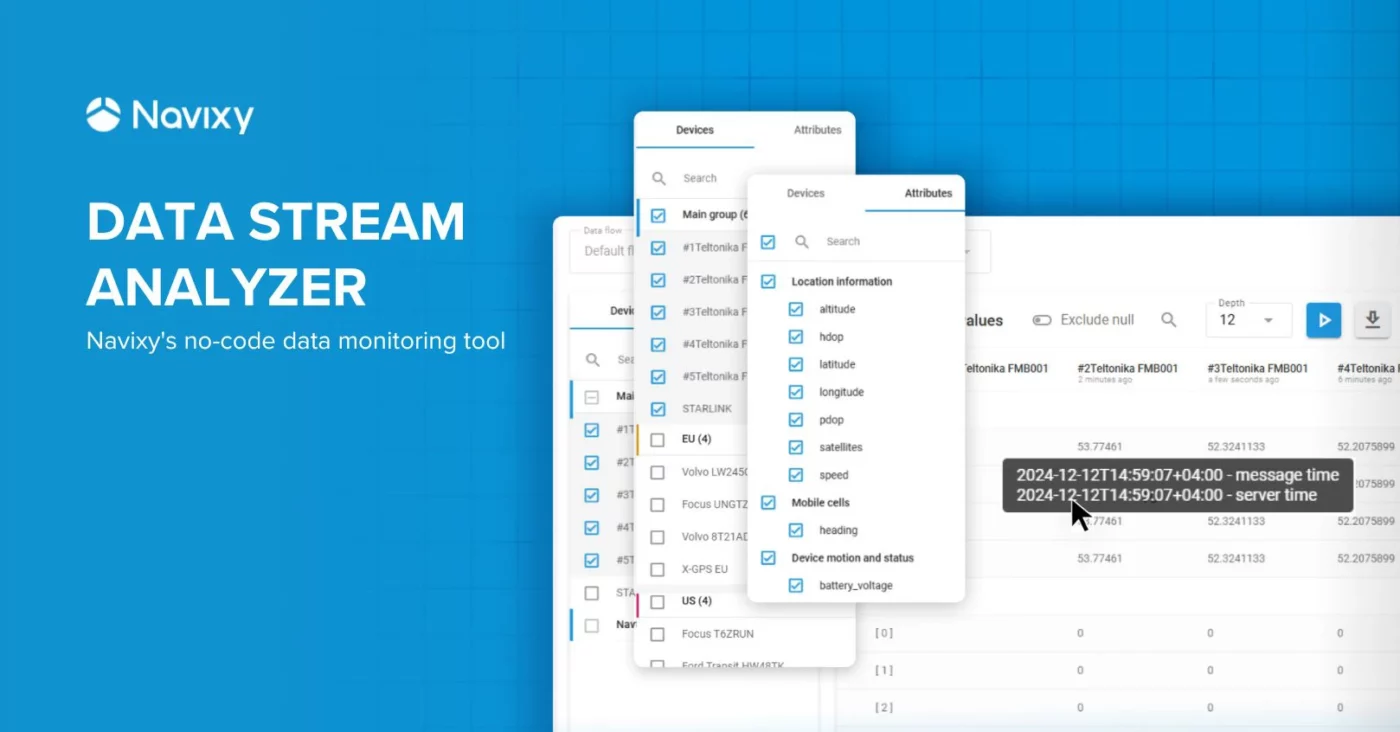Our clients often face complex tasks that require multiple alert rules, such as monitoring refrigeration units or tracking vehicle states. With these cases increasing daily, we've developed an innovative solution—multi-conditional alert rules for sensors. This article discusses how our new tool is designed to streamline rule creation and manage large data volumes, ensuring thorough case resolution.
How multi-conditional alert rules help solve business cases
Multi-conditional alert rules can be triggered based on a multitude of conditions as opposed to just one. This flexibility allows for tailored and highly specific tracking scenarios, with each rule catering to a specific use case. The precision afforded by this approach ensures the efficient deployment of fleet resources and enhances operational effectiveness.
There's no limit to the number of devices you can associate with a single rule, meaning you'll be able to add countless different sensor types to a single rule to monitor various states. The crucial condition is that all sensors must be set up and named in the same manner, which the “Sensor copy” feature makes easy and straightforward.
A crucial feature of multi-conditional alert rules is the ability to assign them to multiple devices. This reduces the need for repetitive actions and facilitates a more streamlined tracking process. By assigning multiple devices to a single rule, fleet managers can obtain consolidated data that offers a comprehensive view of the fleet's performance. Moreover, the process of creating these alert rules is user-centric, beginning with the selection of the rule type itself. This means that fleet managers first select the specific task they wish to monitor, followed by the appropriate GPS devices and sensors. This task-oriented approach simplifies the process and makes it more intuitive, allowing managers to effortlessly design tracking systems that precisely meet their needs. However, you can still create and assign rules using the previous method.
Lastly, product teams developing their own solutions based on Navixy functionality can generate alert rules using the API, a feature that expands the versatility and adaptability of multi-conditional GPS tracking.
Multi-conditional alert cases: cold chain, vehicle maintenance, & EV monitoring
As we delve deeper into the benefits of multi-conditional alert rules in GPS fleet tracking, it’s important to illustrate their practical application. The following use cases represent real-world scenarios where these advanced features may be deployed and how businesses may harness the power of multi-conditional alert rules to streamline their operations, enhance efficiency, and drive growth.
Cold chain
Multi-conditional alert rules in GPS tracking can be leveraged to monitor refrigeration units, taking into account variables such as temperature, humidity, and door states. A single rule configured with multiple conditions can provide a holistic view of the refrigeration unit's status in real-time. For instance, if the temperature exceeds the set threshold or the humidity is abnormal, the system triggers a notification to the designated employee. This immediate alert system ensures swift action to rectify the anomalies and maintain optimal conditions within the refrigeration unit.
The multi-conditional rule continues to monitor and relay information until all conditions return to normal, protecting the quality and safety of the goods stored within. This advanced functionality offers a robust solution for complex tasks that require extensive control, thereby transforming cold chain monitoring.
Vehicle maintenance
Vehicle maintenance is critical for keeping fleet operations efficient and drivers safe. Multi-conditional GPS tracking eases this task by monitoring various vehicle metrics. These can include the coolant and engine temperature, Diagnostic Trouble Codes (DTC), tire pressure, fuel level, and battery status, among others. So, with a single rule configured for multiple conditions, fleet managers can gain a more comprehensive overview of vehicle health. Whenever these monitored elements display abnormal values, a notification is immediately triggered that alerts the relevant personnel.
This proactive approach allows for issues to be addressed before they escalate into more significant problems that could lead to vehicle breakdowns or accidents. The immediate notification system also ensures that drivers are well-informed about the vehicle's state, enabling them to take preventive measures when necessary. This holistic view and real-time information made possible with multi-conditional GPS tracking enhances vehicle upkeep, fleet management, and overall operational efficiency.
Electric vehicle monitoring
Electric vehicles (EVs) are at the forefront of the automotive industry's shift towards sustainability, and multi-conditional GPS tracking plays a pivotal role in managing the many crucial parameters that need constant monitoring. For instance, it can track the battery level in real-time, sending instant alerts when its charge falls below a predetermined threshold. Such alerts assist drivers in planning charging stops, thus preventing unexpected power depletion.
Similarly, monitoring temperature fluctuations helps prevent battery degradation, which increases the lifespan of the vehicle's most vital component. The system can also track the charging status, notifying users when the vehicle is fully charged and ready for use. This comprehensive monitoring system enhances the ownership experience, making it easier and more efficient to maintain an EV.
Conclusion
These alert rules allow for the simultaneous operation of multiple conditions, streamlining the rule creation process and managing vast amounts of data from various sensors. By enabling tailored and highly specific tracking scenarios, multi-conditional alert rules enhance operational effectiveness, reduce repetitive actions, and offer a comprehensive view of fleet performance. All of these advantages provide fleet companies, system integrators, and product teams with a powerful set of tools that optimizes business processes and drives growth.







